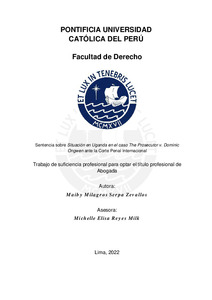| dc.contributor.advisor | Reyes Milk, Michelle Elisa | |
| dc.contributor.author | Serpa Zevallos, Maiby Milagros | |
| dc.date.accessioned | 2023-08-09T14:59:46Z | |
| dc.date.available | 2023-08-09T14:59:46Z | |
| dc.date.created | 2022 | |
| dc.date.issued | 2023-08-09 | |
| dc.identifier.uri | http://hdl.handle.net/20.500.12404/25687 | |
| dc.description.abstract | En el presente trabajo se aborda los crímenes de “embarazo forzado” y “matrimonio
forzado”, a la luz del caso Prosecutor vs. Ongwen ante la Corte Penal Internacional. En
ese sentido, esta sentencia sanciona, por primera vez, por embarazo forzado como un
crimen de lesa humanidad y de guerra, además que identifica la sanción de matrimonio
forzado como un crimen de lesa humanidad, a través de la cláusula residual “otro acto
inhumano” (7.1.k del Estatuto de Roma). Ante ello, sostenemos que, si bien la sentencia
de culpabilidad resulta importante a efectos de la rendición de cuentas y de la justicia
hacia miles de víctimas, consideremos que la Sala de Primera Instancia no desarrolla el
bien jurídico protegido sobre “autonomía reproductiva”, ello a razón de las implicancias
que conlleva su reconocimiento y ejercicio del mismo, en virtud de los instrumentos
internacionales de derechos humanos, principalmente el artículo 16 de la CEDAW. Por
otro lado, consideramos que con la sanción por “embarazo forzado”, mediante“otro acto
inhumano” (7.1.k del Estatuto de Roma), se da el reconocimiento de un nuevo crimen
independiente de la lista contemplada en el artículo 7.1 del Estatuto de Roma, lo cual
permite abordar el bien jurídico protegido de “autonomía conyugal”. Por lo tanto, en la
primera parte del trabajo se aborda de manera histórica y conceptual los crímenes de
violencia sexual y reproductiva. Seguidamente, se desarrollan los crímenes de
embarazo forzado y matrimonio forzado, a partir de la sentencia del caso Ongwen.
Finalmente, ante el actual estado de proceso de apelación del caso, abordamos cuatro
amicus curiae, los cuales nos permiten sustentar nuestra posición | es_ES |
| dc.description.abstract | This paper deals with the crimes of "forced pregnancy" and "forced marriage", in light of
the Prosecutor vs. Ongwen before the International Criminal Court. In this sense, this
sentence sanctions, for the first time, for forced pregnancy as a crime against humanity
and war, in addition to identifying the sanction of forced marriage as a crime against
humanity, through the residual clause "another inhuman act ” (7.1.k of the Rome
Statute). Given this, we maintain that, although the sentence of guilt is important for the
purposes of accountability and justice towards thousands of victims, we consider that the
Trial Chamber does not develop the protected legal interest on "reproductive autonomy",
this due to the implications of its recognition and exercise of the same, by virtue of
international human rights instruments, mainly article 16 of the CEDAW. On the other
hand, we consider that with the sanction for “forced pregnancy”, by means of “another
inhuman act” (7.1.k of the Rome Statute), a new crime independent of the list
contemplated in article 7.1 of the Statute is recognized. of Rome, which allows
addressing the protected legal right of "marital autonomy". Therefore, in the first part of
the work, the crimes of sexual and reproductive violence are addressed historically and
conceptually. Next, the crimes of forced pregnancy and forced marriage are developed,
based on the sentence of the Ongwen case. Finally, given the current status of the
appeal process of the case, we address four amicus curiae, which allow us to support
our position | es_ES |
| dc.language.iso | spa | es_ES |
| dc.publisher | Pontificia Universidad Católica del Perú | es_ES |
| dc.rights | info:eu-repo/semantics/openAccess | es_ES |
| dc.rights.uri | http://creativecommons.org/licenses/by-nc-nd/2.5/pe/ | * |
| dc.subject | Corte Penal Internacional | es_ES |
| dc.subject | Derechos humanos | es_ES |
| dc.subject | Violencia sexual | es_ES |
| dc.subject | Violencia contra la mujer--Legislación | es_ES |
| dc.title | Sentencia sobre Situación en Uganda en el caso The Prosecutor v. Dominic Ongwen ante la Corte Penal Internacional | es_ES |
| dc.type | info:eu-repo/semantics/bachelorThesis | es_ES |
| thesis.degree.name | Abogado | es_ES |
| thesis.degree.level | Título Profesional | es_ES |
| thesis.degree.grantor | Pontificia Universidad Católica del Perú. Facultad de Derecho | es_ES |
| thesis.degree.discipline | Derecho | es_ES |
| renati.advisor.dni | 40514122 | |
| renati.advisor.orcid | https://orcid.org/0000-0003-2909-5026 | es_ES |
| renati.author.dni | 72607748 | |
| renati.discipline | 215106 | es_ES |
| renati.juror | Constantino Caycho, Renato Antonio | es_ES |
| renati.juror | Zafra Ramos, Rita del Pilar Lucila | es_ES |
| renati.level | https://purl.org/pe-repo/renati/level#tituloProfesional | es_ES |
| renati.type | https://purl.org/pe-repo/renati/type#trabajoDeSuficienciaProfesional | es_ES |
| dc.publisher.country | PE | es_ES |
| dc.subject.ocde | https://purl.org/pe-repo/ocde/ford#5.05.01 | es_ES |







